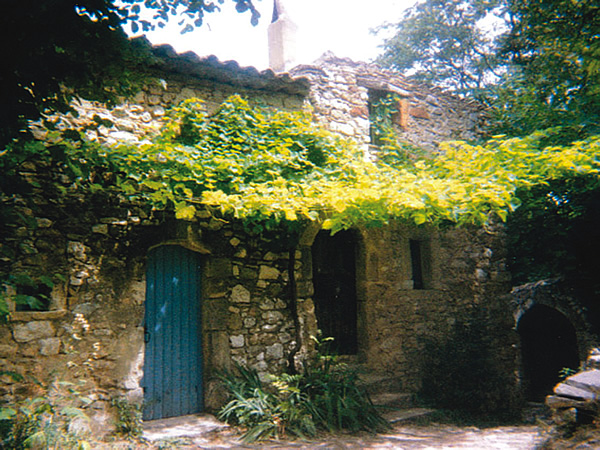Volunteer in France Restoring an Ancient Village
Article & Photo by Linda Handiak
 |
An example of La Sabranenque’s rustic housing for volunteers. |
There is a way to feast on Provence’s food and scenery without wrecking your budget or the environment. Volunteer for La Sabranenque, a nonprofit organization in southern France committed to revitalizing
historic villages and preserving traditional, environmentally friendly building techniques.
Volunteer for the Environment on a Budget
Volunteers can sign on for week-long sessions in fall and spring or for 2-week projects in summer. The fee for participation for a week is 300 euros which includes lodging, meals, and activities. No experience is required since volunteers are supervised by qualified technicians.
The projects usually draw people from a wide range of nationalities and occupations, including architects, teachers, and museum curators.
From the Great City of Avignon to Beautiful Saint Victor la Coste
Volunteers are picked up at the Avignon train station and driven past rows of ancient stone walls and brilliant sunflowers to the project’s headquarters at Saint Victor la Coste, one of the most beautiful villages
in France.
Meals are served on a terrace in the shade of fruit trees. Lodging is by twos in stone huts overlooking a Van Gogh landscape of vineyards and cypresses. Participants can visit the village on their own during afternoons off,
or they can wait for the organized trips offered once during every 2-week session. They may be driven to a local market, monument, or nearby town such as Arles.
Workdays begin at 8 a.m. and break off before the afternoon heat blankets the village. Volunteers help carry water and equipment up to an 11th century castle, negotiating a winding path designed to inconvenience invading
armies. Castellas, built by the Sabran family, made Saint Victor one of the best-defended points of the region and now makes the village a stopover for curious visitors.
During the last few years work extended beyond the castle to encompass nearby villages as well. The staff uses building techniques that are native to the region: locally gathered raw materials, simple hand tools, and
homemade mortar. Small teams of supervised volunteers may be involved in consolidating castle structures or in restoring village paths, ramparts, and chapels. The enthusiastic staff breathes fresh life into crumbling stones and into tired volunteers.
The director of La Sabranenque, exhorts workers grappling with dry stone walling to “listen” to the stones and let them find their natural place. If you are successful, the rewards are great. “Now,” beams
the director, “the walls are smiling.”
This sensitivity to the environment is passed on to volunteers. The staff reminds workers that every drop of water is precious in a region that sees so little rain. Buckets have to be carried with great care and laundry
is done manually in a large sink. Clothes dry quickly in the arid Mediterranean climate.
Volunteers have the option of working mornings and taking time off in the afternoon or participating in more specialized afternoon workshops. A master stonecutter offers instruction in chiseling stones for arches
and windows. He cuts with the care and attention of a surgeon and teaches with infinite patience. Recently, much of the restauration has been completed and most of the work now consists in maintenance of the beautiful village and castle grounds.
Share in the Cooking of the Communal Meals
Volunteers take turns helping in the kitchen, where they are taught to recognize and select appropriate herbs from the garden and to appreciate the virtues of living, organic food. Eggs are gathered from local chickens,
figs and apricots from nearby trees. According to the chef, passing food through a blender is enough to oxidize it unnecessarily. “Slow food” is the order of the day. Volunteers are occasionally asked to fetch some of the local produce,
a treat if you have to get fresh bread from the boulanger or wine from the viticulteur. If you are with a staff member, you may even be invited to the cave to sample some Laudun wine. The La Sabranenque project will educate your palate, heart,
and mind.
The owner of one of Saint Victor’s two general stores offered this perspective. Tourists, he explained, come mostly to take pleasure and form few attachments. “La Sabranenquers,” on the other hand, come
to give something to the village.
Volunteering at La Sabranenque
►
Visit Sabranenque for more information.
► Minimum one-week participation includes room, board, and activities for 300 euros a week.
► July is a good time to go if you want to take in the spectacular and lively Avignon
Arts Festival — street performances, plays, and poetry readings. Since you’ll be picked up and dropped off in Avignon, it’s convenient to spend an extra day or two there. If you do go in July, you may also see the Medieval
Festival. Locals dress up in period costume and joust on the plateau below Castellas. |
Linda Handiak has volunteered for restoration and conservation organizations throughout Europe.
|
